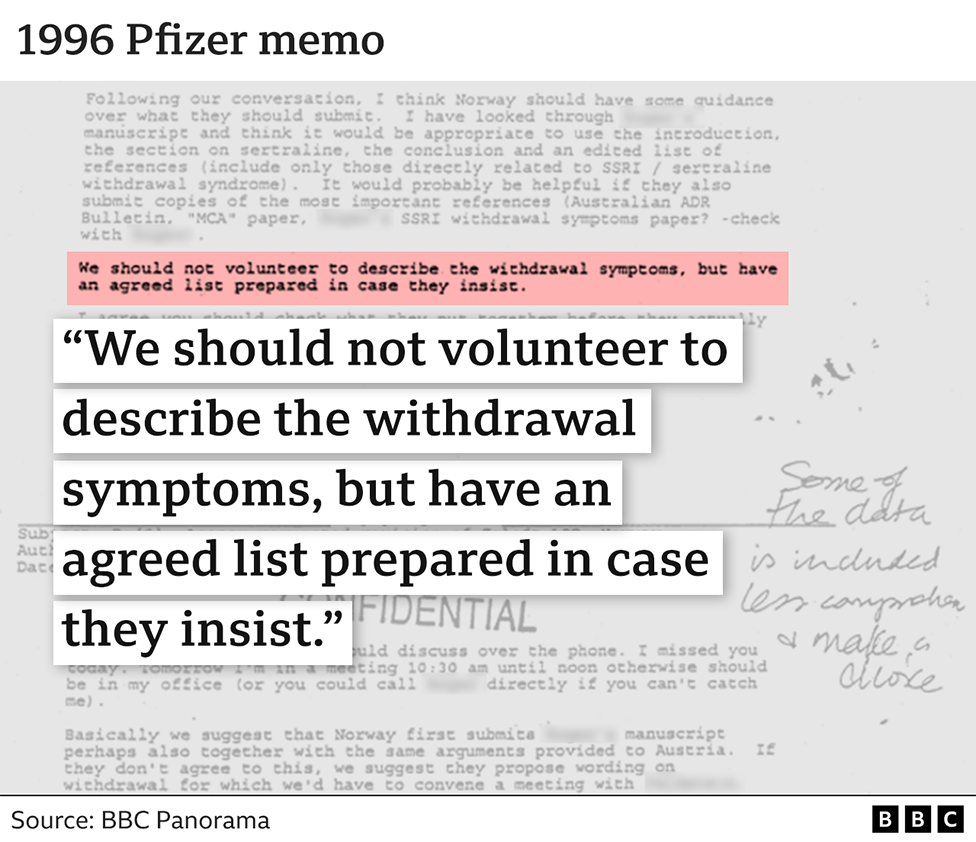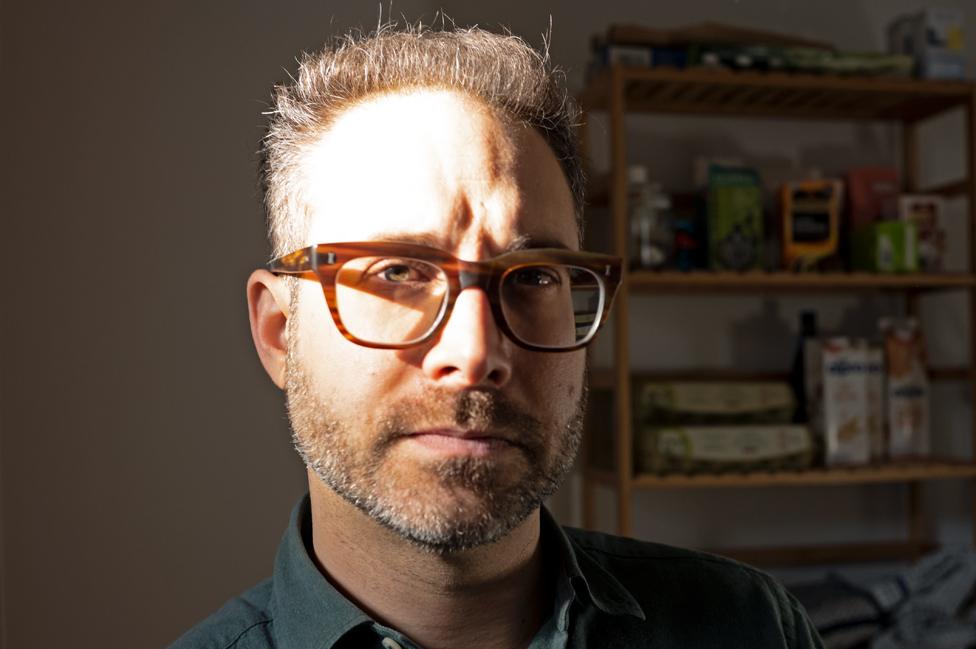Antidepressants: Two million taking them for five years or more
- Published

More than a quarter of patients on antidepressants in England - about two million people - have been taking them for five years, the BBC has found.
This is despite there being limited evidence of the benefits of taking the drugs for that length of time.
A doctor who runs an NHS clinic helping people off the pills says withdrawal symptoms can make it hard for some to stop taking their medication.
Withdrawal guidance was updated in 2019, but he says little has changed.
More than eight million people in England are on antidepressants - which are prescribed for depression, anxiety and obsessive compulsive disorder and other conditions. That's one million more people than five years previously, NHS prescribing figures show, external.
The new figures on long-term use - for the period 2018-2022 - were provided to BBC Panorama by the NHS, following a Freedom of Information request. The data gives an overall picture but does not reflect the circumstances of individual patients, some of whom could be on antidepressants long-term for good reason.
The investigation also uncovered evidence that a leading drug company attempted 27 years ago to conceal possible withdrawal effects that one drug could cause.
Modern antidepressants - called SSRIs (Selective Serotonin Re-Uptake Inhibitors) - arrived from the late 1980s, including Prozac. They were quickly heralded as wonder drugs compared with earlier medications, some of which had serious side effects.
They were thought to treat depression by fixing an imbalance of the mood-regulating chemical serotonin in the brain. Researchers are now not clear how they work. One theory is that they simply change how you think or feel, rather than rectifying an underlying problem.
The NHS recommends antidepressants as a treatment for more severe depression. Talking therapy as well as exercise and lifestyle changes might be recommended instead of, or in combination with, the medication.
"Throughout my long and extensive career, I have seen people benefit from antidepressants," said Prof Wendy Burn, former president of the Royal College of Psychiatrists.
"I see them working in my clinical practice, I see lives being changed by them."
But she added: "People are staying on antidepressants longer, and we don't really have long-term studies that support that."

Prof Wendy Burn helped change official guidance on antidepressants
There has long been a debate about how effective antidepressants are. The most comprehensive research, external, from the University of Oxford, suggests antidepressants do help some people, at least in the short-term.
But on average, their benefits are relatively modest, and the way people respond varies, with some not responding at all, according to the researcher who led the study.
And there is some evidence to suggest that long-term antidepressant use may be linked to some health risks, such as heart problems, external and diabetes. It is also thought that long-term use may lead to a higher risk of withdrawal symptoms in some people.
Withdrawal can happen when you stop a drug that your body has become used to.
Taking that drug away too quickly, before the brain has had time to adjust, can lead to symptoms - including low mood and feelings of anxiety. Some symptoms overlap with the original condition the drug was prescribed for, which means the withdrawal can sometimes be confused with relapse.
The symptoms depend on the individual, which drug they were taking, and for how long. Many patients can stop taking antidepressants without experiencing any problems.

If you are affected by any of the issues in this article you can find details of organisations that can help via the BBC Action Line

Panorama has uncovered evidence to suggest that one major drug company which manufactured SSRI antidepressants had become increasingly aware of a whole range of withdrawal symptoms from the mid-1990s, but was reluctant to share this information with the public and medicines regulators.
A copy of a confidential 1996 memo from firm Pfizer - which originally sold sertraline, now the UK's most common antidepressant - shows employees discussing what the drug company would tell regulators in Norway.
"We should not volunteer to describe the withdrawal symptoms, but have an agreed list prepared in case they insist," the memo says.

Some of the withdrawal reactions the memo refers to include sensory disturbances, sweating, nausea, insomnia, tremors, agitation and anxiety.
Pfizer no longer produces sertraline. Responding to Panorama's findings, a spokesperson said the company "monitored and reported all adverse event data" to licensing authorities, "in line with its legal and regulatory obligations and updated sertraline labelling as required."
It added: "Public health organisations and professional medical bodies throughout the world have recognised sertraline and other SSRIs as the treatment of choice for adult depression." The company said the drug's label warned about withdrawal and had been updated "as required".
The Royal College of Psychiatrists published updated information on withdrawal in 2019 - overseen by Prof Burn, who was its president at the time. It came after she heard testimony from patients who had experienced severe withdrawal effects.
Until then, guidance used by the NHS and the college maintained withdrawal was mostly mild and short-lived - lasting no more than about a week.
Now NHS guidance reflects that it can be severe and longer-lasting for some, and withdrawal can last many months.

Information on stopping antidepressants
Patients with concerns about their medication should discuss them with their doctor. Stopping an antidepressant suddenly can be dangerous
Doctors say it is always important to seek advice and treatment for mental health problems and to try to have any medication regularly reviewed
Visit the NHS, external, the Royal College of Psychiatrists, external and Leap For PDD, external websites for information

A Royal College of Psychiatrists spokesperson told the BBC: "Medicine continuously evolves, as does our knowledge of treating mental illness. As a result, the college updates its guidance when new evidence comes to light."
A lack of awareness about withdrawal difficulties has meant that even medical professionals who prescribe the drugs have struggled to stop taking antidepressants themselves.
Dr Mark Horowitz, who tried to stop the antidepressants he had taken for 15 years in 2015, said: "It led to complete havoc in my life," he says. "I would wake up in the morning in full panic, like I was being chased by an animal."
The panic he felt would last until late into the evenings and he took up running as a distraction.
"I ran until my feet bled, because it gave me a slight reprieve from that panic sensation."
He said it was worse than the symptoms that led him to take antidepressants in the first place.

Panorama examines whether the current generation of antidepressant drugs have lived up to their promises, following patients who have suffered serious side effects.
Watch The Antidepressant Story on BBC One at 20:00 on Monday 19 June (20:30 in Wales and Northern Ireland) and on BBC iPlayer afterwards (UK only)

He is concerned that far more work has been done on how to start patients on antidepressants - and much less on stopping.
"To me, it's the same as allowing cars to be sold without brakes," he said.
"We should know how to start the car and how to stop it."
Now Dr Horowitz runs England's only NHS antidepressant deprescribing clinic - a pilot scheme set up in London in 2021 to help people struggling to stop taking their medication.
At the moment he is seeing about 25 patients.
Despite withdrawal guidance having been updated, Dr Horowitz thinks patients are still struggling to get tailored advice. Guidance for doctors now recommends that people reduce the dose of their medication in stages, but it does not specify how long it should take. It's different for everyone.

Dr Horowitz is still trying to reduce his antidepressant dose - and hopes to stop altogether this year
The Royal College of GPs told Panorama that family doctors were "highly-trained to have frank and sensitive conversations" with patients about the risks and benefits of antidepressants.
"Amid intense workload and workforce pressures," it said it was, "increasingly difficult to offer patients the time they need within the constraints of a standard 10-minute consultation."
The companies behind the most widely used antidepressants told Panorama that many clinical trials and studies, including ones conducted by independent researchers, had shown their drugs to be effective.
They said the drugs had been taken by many millions worldwide for potentially devastating and sometimes life-threatening conditions.
As with all medicines, they said, antidepressants have potential side effects which are clearly stated in the prescribing information. They added that their drugs are considered to be safe, with a positive benefit-risk ratio by doctors, patients and regulators around the world.
Related topics
- Published17 January 2023
